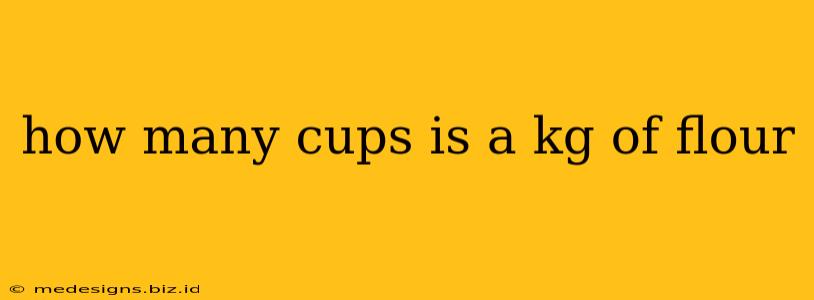How Many Cups is a Kg of Flour? A Baker's Guide to Conversions
Knowing how many cups are in a kilogram of flour is crucial for bakers of all levels. Whether you're meticulously following a recipe from a foreign cookbook or simply need to adjust a recipe based on what you have on hand, accurate flour measurement is key to baking success. This guide will break down the conversion and help you understand the nuances that affect the final measurement.
The Complicated Truth: It's Not Always a Straight Conversion
Unfortunately, there's no single, universally accurate answer to the question "How many cups are in a kilogram of flour?" The reason? Flour density varies significantly.
- Type of Flour: All-purpose flour, bread flour, cake flour, and other specialty flours all have different densities. Bread flour, for example, is often denser than cake flour.
- Sifting: Sifting flour aerates it, making it less dense and increasing the volume. Unshifted flour will pack more tightly into a cup.
- Measuring Method: Scooping flour directly from the bag results in a much denser cup than spooning it gently into a measuring cup.
Approximate Conversions and Best Practices
While a precise conversion is impossible without considering these factors, we can provide some useful approximations:
-
All-purpose flour: 1 kg of all-purpose flour is roughly equivalent to 10-12 cups. This range accounts for the variations in packing and sifting.
-
Bread flour: Bread flour tends to be denser, so 1 kg might be closer to 9-11 cups.
-
Cake flour: Cake flour is lighter and fluffier, meaning 1 kg could yield closer to 11-13 cups.
For the most accurate results, always weigh your flour using a kitchen scale. This is the most reliable method to ensure consistent baking results. Cups can be deceptive, and even slight variations can impact your baked goods.
Why Weighing Flour is the Baker's Best Friend
Using a kitchen scale eliminates the guesswork and inconsistencies associated with volume measurements. It guarantees precise measurements every time, leading to:
- Consistent Results: Baking is a science, and precise measurements are essential for predictable outcomes.
- Improved Recipes: Following recipes based on weight allows for more accurate scaling up or down.
- Fewer Baking Disasters: Avoid those frustrating times when your cake is too dry or your bread is too dense due to inaccurate flour measurements.
Conclusion: Weigh, Don't Guess!
While approximate cup-to-kilogram conversions for flour are helpful for quick estimations, weighing your flour is the gold standard for accurate baking. Invest in a kitchen scale and enjoy the improved consistency and predictability in your baking adventures! Your cakes, breads, and other baked goods will thank you for it.
